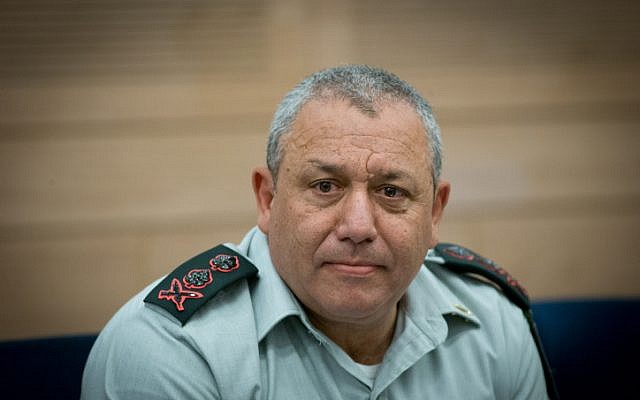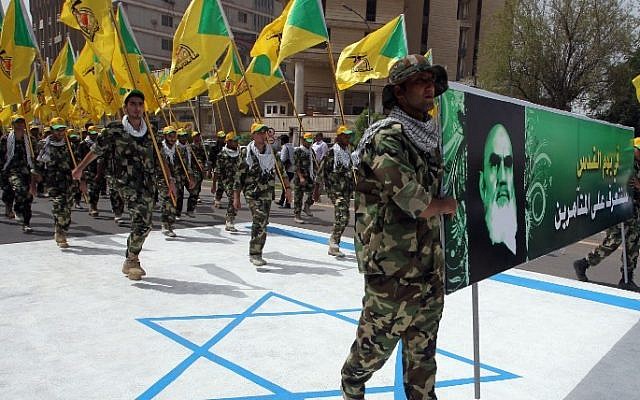Eisenkot tell Arab press Jerusalem and Riyadh in complete agreement on Islamic Republic, which he calls ‘the biggest threat to the region’

In an unprecedented interview to a Saudi news outlet, Israel Defense Forces Chief of Staff Gadi Eisenkot said Thursday that the Jewish state is prepared to share intelligence with the Gulf kingdom in their joint efforts to curb Iranian influence in the region.
Israel and Saudi Arabia do not have official diplomatic relations.
Speaking with the London-based, Saudi-owned news site Elaph, Eisenkot, in his first-ever interview with Arabic media, laid out what he thinks are Iran’s ambitions in the Middle East, and made clear that Israel isn’t interested in a war now with the Iranian-backed Lebanese terror group Hezbollah, despite Iranian attempts to bring about an escalation.
“With [US] President Donald Trump there is an opportunity for a new international coalition in the region. There should be a major regional plan to stop the Iranian threat,” said Eisenkot.
“We are ready to exchange experiences with moderate Arab countries and to exchange intelligence to confront Iran,” he added.
Asked whether Israel has shared “information” with the Saudis recently, Eisenkot responded, “We are prepared to share information if it is necessary. There are many mutual interests.”

He called Iran the “biggest threat to the region.”
When asked what he thinks Iran wants, Eisenkot said, “The Iranian plan is to control the Middle East by means of two Shiite crescents. The first from Iran through Iraq to Syria and Lebanon, and the second from Bahrain through to Yemen until the Red Sea.”
“This is what must be prevented in the region,” he said.
“In this matter there is complete agreement between us and the Kingdom of Saudi Arabia, which has never been our enemy. It has not fought us nor have we fought it,” he added.
He continued: “When I was at a meeting of the Joint Chiefs of Staff in Washington and heard what the Saudi representative had to say, I found it identical to what I think about Iran and the need to confront it and to confront its expansion in the region.”

Addressing the sudden resignation last week of the prime minister of Lebanon, Saad Hariri, Eisenkot said the move was “complicated” and “surprising.”
Hariri said he quit due to an alleged Iranian plan to assassinate him.
Regarding Hezbollah, Eisenkot said that “is beginning to feel financial pressure and starting to get into big material problems,” adding that there has been a noticeable decline in support for the terror group in Lebanon at a level unseen before.
In the wake of allegations in the Arab world that Israel is planning on striking Hezbollah, Eisenkot said, “We have no intention of attacking Hezbollah in Lebanon and bring about a war.
“However,” he added, “we will not accept a strategic threat to Israel.”
He said he has been happy with the past 11 years of relative quiet since the Second Lebanon War, but added Israel sees “Iranian attempts to bring about an escalation, but I think it’s unlikely at this stage.”

Eisenkot repeated Israel’s demand that Iran and its militias, including Hezbollah, leave Syria, where they have been fighting in the ongoing civil war. He added that Israel especially would not allow an Iranian presence west of the Damascus-Suwayda road.
The Elaph news site has interviewed a number of senior Israeli defense officials in the past, including the coordinator of government activities in the territories and the IDF spokesperson.
Eisenkot is not the first Israeli army chief to do an interview with Arab media. In 2005, Dan Halutz gave an interview to the Qatari satellite station al-Jazeera, and in that same year, the then outgoing chief of staff Moshe Ya’alon spoke to the Saudi daily Asharq al-Awsat.
Prime Minister Benjamin Netanyahu has bragged about increasingly high-level behind-closed-doors cooperation with Arab nations with which the State of Israel has no diplomatic relations, especially as regards confronting Iranian influence in the region.




Leave a Reply
You must be logged in to post a comment.